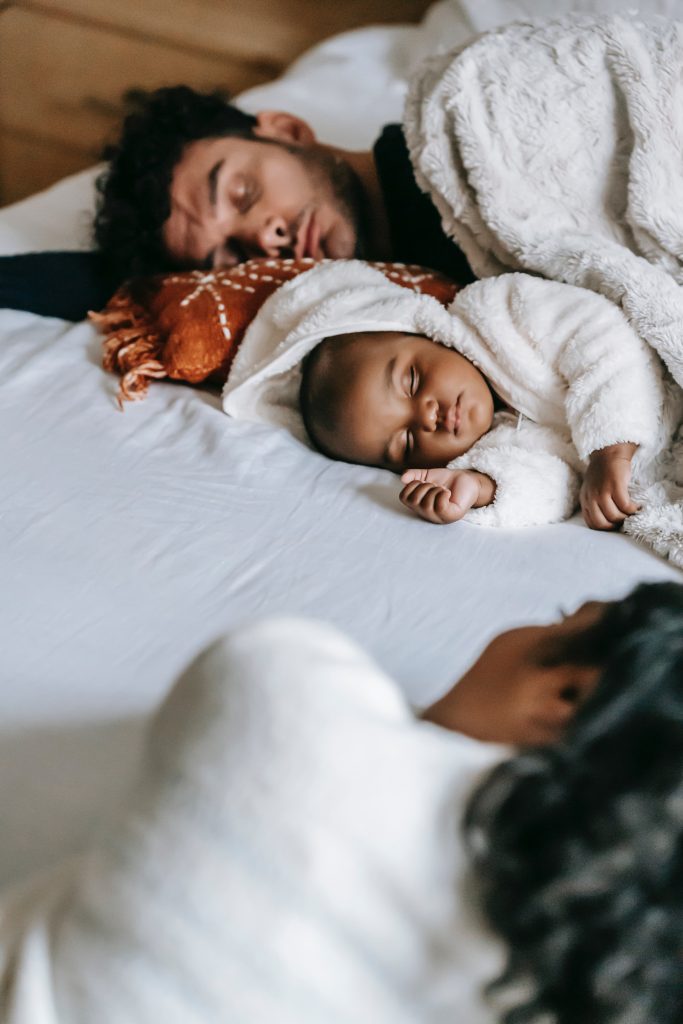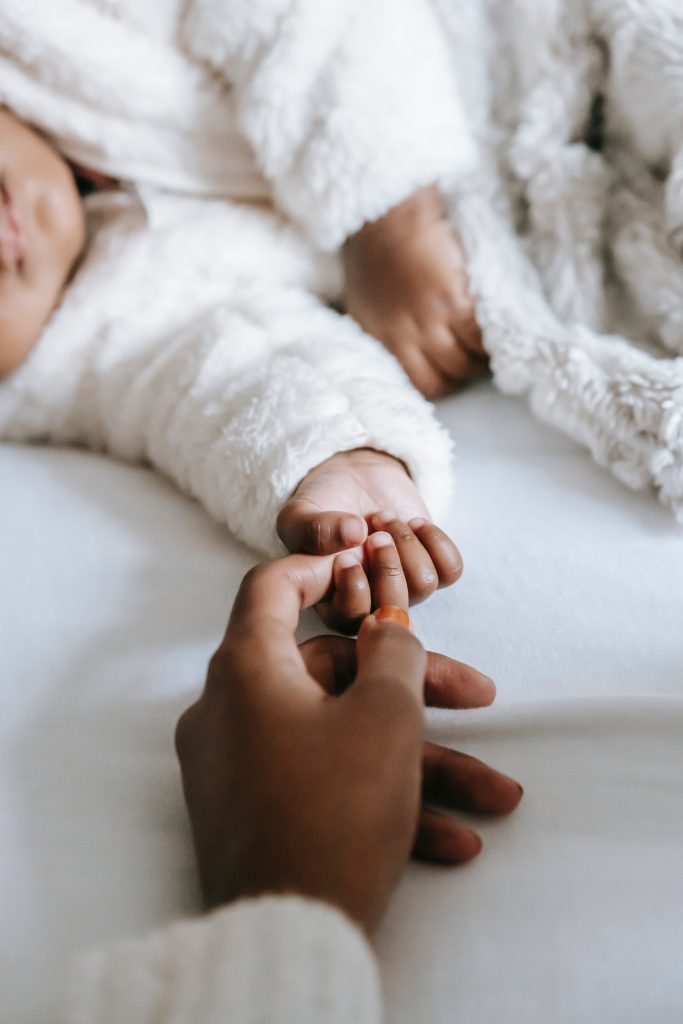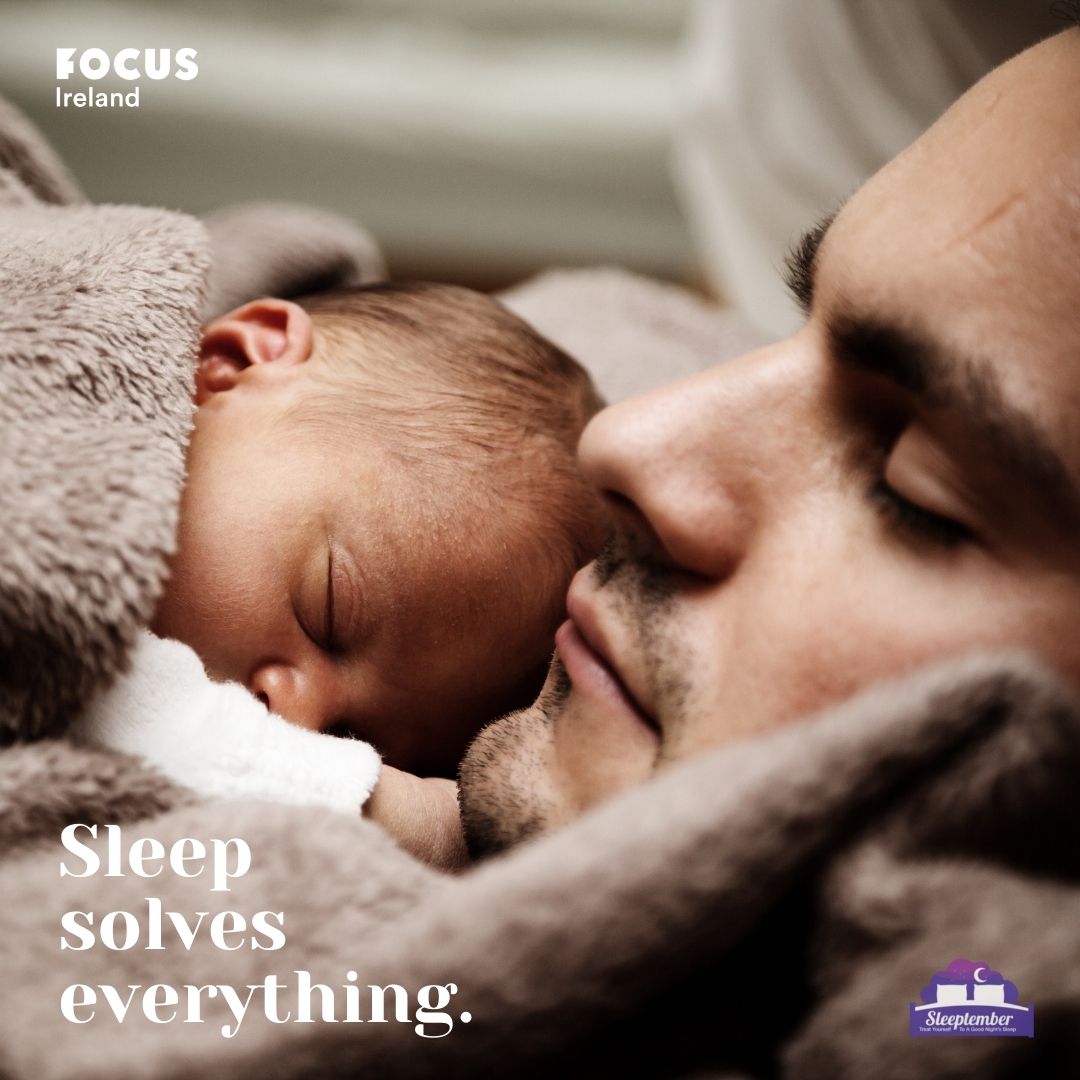We live in a culture where babies are expected to sleep through the night around 6 months or so. While some babies seem to just come into this world as great little sleepers, others, unfortunately, don’t, so the expectation around sleep can cause added stress to parents who are already exhausted.
Sleep training is extremely popular, and parents pay sleep consultants to help their little one start getting more sleep. This decision comes down to what each family needs. If the well-being of a parent is being impacted by their lack of sleep, then it might feel like the only solution. Trying to meet the demands of work and parenting can often feel (quite rightly) like it’s too much.
We may also feel that if we don’t sleep train that we will be exhausted and might be moodier and less present for our babies.

Sleep Routines
Every family must figure out what works for them. Something important to note is that there are gentle and responsive sleep coaches that can work well. Families often report their babies adapt well to sleep routines without causing any stress to the child.
An important research finding is that science tells us that for 20% of babies (which is a lot, 1 in 5) no form of sleep training will work no matter what you do. We might wonder what this all looks like in practice. Modern-day sleep training does not always mean the harsh “cry it out approach” as originally designed by Dr Holt and Dr Spock. The idea here is that babies are placed in their cots, told goodnight, and are left to “cry it out” and as a result become trained to sleep on their own. Attachment scientists and researchers suggest however that most of these babies become extremely stressed, and eventually shut down. A related study found that babies may not cry out anymore, but their cortisol (stress) levels continue to remain high even though they have stopped crying. Essentially, they recognise no one is coming for them so they stop trying and learn to go asleep.
Again, most sleep training does not involve these harsh methods that are damaging for infant mental health. The most common approaches now usually involve some form of gradual extinction, meaning parents put their baby down while they are still awake and wait periods of time before they respond to their children’s crying. The goal is that the baby eventually will learn to sleep on their own. This can work for some children without causing them too much stress. Some babies will fuss for a short time but can settle themselves quite quickly without any distress. However, this is not always the case, and some babies may find this quite difficult. It is important to look at individual differences for babies, what works for one won’t work for the other.
Self-Soothing

Some of the popular publications on babies and sleep highlight that babies need to learn how to self soothe. However, self-soothing is a developmental skill that babies and young children acquire in response to how they are soothed by their caregivers. So, while some babies may settle themselves back asleep, they are not actually self-soothing. Babies do not have the cognitive skills to understand
“Oh, mom/dad said goodnight and they will see me in the morning. It’s okay I know they are only in the other room, I’ll be okay” so while a relaxed baby may be able to settle themselves without getting too upset, a sensitive baby who cries is crying because they are scared or lonely.
For the babies that become very upset, that fight or flight cry (which sounds like an angry cry) then they are looking for a caregiver and if possible, we should respond to them. The science and research on brain development will tell us that babies should not be left in high-stress states for long periods. If they are very distressed, then this may be traumatic for them. It all comes down to temperament and parents know their own baby best.
Something that unfortunately isn’t normalised in western society is that babies are hardwired to be close to us! It’s completely normal for a baby to want to be close to their parents and there is no exact time a baby or toddler “should” be sleeping through the night! There are so many different reasons why they might wake, they might feel lonely, scared, the arrival of a new baby, their teeth hurt, they have a cold etc. There is also no exact time a baby “should” be in their room.
Our beliefs about sleep are more a reflection of the culture we live in rather than on the research and developments of science. Western society promotes independence early on and, rather than it being the norm, we tend to judge others who sleep with their babies or toddlers. It is viewed as strange in a culture that promotes individualism. Most non-western societies all co-sleep and have been co-sleeping for thousands of years. Professor James McKenna is a professor of anthropology and the director of the Mother-Baby Behavioural Sleep Laboratory at the University of Notre Dame. He is a world-renowned expert on infant sleep and has dedicated over 30 years of scientific research to babies’ sleep. His findings show that when parents and babies sleep together, their heart rates, brain waves, sleep states, oxygen levels, temperature, and breathing influence one another. The research shows that parents and babies who co-sleep, while they might wake more frequently, they sleep longer overall. This is often because parents don’t have to get up out of bed to settle the child if they are hungry, looking for a soother and so on.
We might be thinking “What if I’m spoiling them and will I ever get them into their room???!” Don’t worry! It is impossible to spoil a baby with nurturing and responsiveness. Also, the research shows that while it can take up to a year longer for these babies to sleep independently, they do eventually get there and are usually the children who don’t come into the bed as they get older! Meaning they often become very independent. If we force independence too early, it can work in the short term, but it can create more anxiety later.
This is not for every family, and it certainly doesn’t mean those who don’t co-sleep are creating anxious children!! It is just helpful for those who do, to know they are doing absolutely nothing wrong and serves as a reminder that it is biologically very normal.

Dr Aoife Durcan
Chartered Counselling Psychologist

